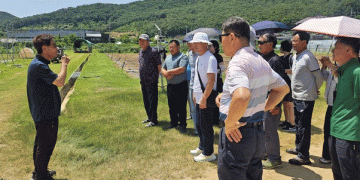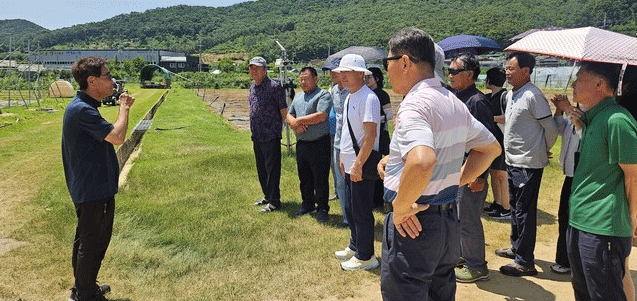Gunwi County (under Mayor Kim Jin-yeol) has gained significant attention for its successful scientific farming demonstration plots, drawing visits from agricultural professionals across South Korea. Recently, a group of 30 cabbage farmers from Busan visited the site to explore alternative crops and heat-resistant varieties suited for summer cultivation.
During the visit, Gunwi County officials introduced two standout varieties being trialed: ‘Gyeongjojeong’ grapes and ‘Golden Ball’ apples, highlighting their unique traits and cultivation advantages.
Key Highlights from the Demonstration Farms
- ‘Gyeongjojeong’ Grapes – An early-season seedless variety with a crisp texture and excellent shelf life, making it highly popular among consumers.
- ‘Golden Ball’ Apples – A heat-tolerant apple variety with a 14.8°Brix sugar content and 0.5% acidity, offering a balanced flavor profile. Unlike traditional apples, it requires no color management and thrives in high temperatures, making it ideal for summer cultivation.
- Double-Cropping Red Beans – Gunwi County is also promoting two-crop red bean farming as part of its regional specialty crop development, enhancing farm profitability.
Why These Innovations Matter
- Climate Resilience: With rising global temperatures, heat-resistant crops like ‘Golden Ball’ apples are becoming crucial for sustainable farming. According to a 2023 FAO report, adapting to extreme weather through resilient varieties could increase farm incomes by up to 20%.
- Consumer Demand: Seedless grapes and non-GMO specialty crops are seeing growing market demand, with the global organic fruit market projected to reach $32 billion by 2027 (Statista, 2023).
- Efficiency & Profitability: Double-cropping systems, such as red beans after early-harvest crops, maximize land use and boost annual revenue per hectare.
Gunwi County’s science-driven approach provides a blueprint for modern, sustainable agriculture. By adopting high-value, climate-resilient crops and innovative farming techniques, farmers can enhance productivity, reduce risks, and meet evolving market demands. As agricultural challenges intensify, such evidence-based models will be key to securing the future of farming.































